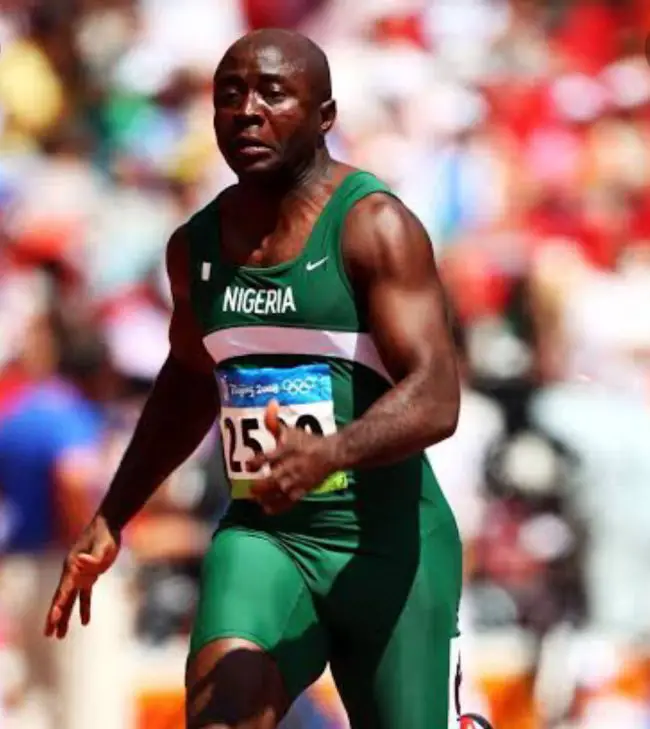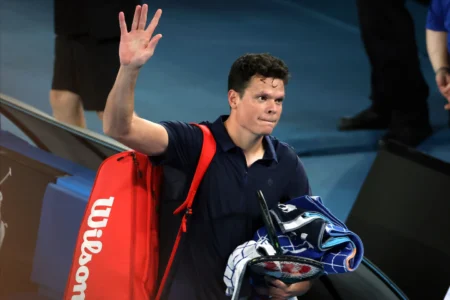1983 World Championships in Athletics
Host city: Helsinki, Finland
Date: 7–14 August
Fresh from their conquests at the World University Games in Edmonton, Alberta, Canada in July 1983, the Nigerian quintet of sprinters Chidi Imoh and Innocent Egbunike, quartermiler Sunday Uti and jumpers Yusuf Alli and Ajayi Agbebaku stormed Helsinki, the capital city of Finland aiming to race and jump to the podium at the inaugural edition of the World Athletics Championships. Three of the quintet (Imoh, Egbunike and Uti) could not make it to the final while the two jumpers, Alli and Agbebaku made it to the final of the long jump and triple jump respectively.
While Alli’s 7.89m leap he repeated thrice in the final did not get him near the podium, finishing in eighth place, Agbebaku made history as his 17.18m effort landed him on the podium as the bronze medal winner.
Agbebaku won Nigeria’s first medal in the history of the championships.
For the women, Rufinah Uba did not go past the quarterfinals in the 100m and 200m events.
1987 World Championships in Athletics
Host city: Rome, Italy
Date: August 28 – September 6
For the second consecutive championships, Nigeria made it to the podium, this time courtesy Innocent Egbunike who moved up to the 400m event after reaching the final in the 200m four years earlier in Helsinki.
The Nigerian was one of the two favourites (alongside Butch Reynolds who ran 44.10 before the championships) to win the gold after running a Nigerian record time of 44.17 seconds less than two weeks to the championships. In Rome, Egbunike was in red hot form and his 44.26 seconds (21.11 at halfway) winning run in the semifinal was the fastest in the championships.
The 1983 World University Games 200m champion went out quickest from lane 7 in the final but was tracked by the Thomas Schönlebe in lane 3. The tall, bespectacled East German – unbeaten all year – proved to be much stronger and passed the Nigerian in the last 60m to win.
In the jumps, there was a Nigerian presence in the triple jump final for the second straight championships with Joseph Taiwo placing sixth (17.29m) while Ajayi Agbebaku, the bronze medal winner from Helsinki failed to make it to the final.
In the long jump, Yusuf Alli made it to his second straight final but failed to advance to the final eight that battled for the medals on offer.
In the men’s 400m hurdles, Henry Amike ran a new 48.50 seconds national record to qualify for the final where he placed sixth (48.63)
For the women, Mary Onyali, silver medallist in the 200m behind compatriot Falilat Ogunkoya a year earlier at the inaugural edition of the World Junior (now U20) championships in Athens, Greece raced all the way to the final in Rome, finishing sixth in 22.52 seconds while her conqueror as a junior international failed to advance to the final (23.71).
1991 World Championships in Athletics
Host city: Tokyo, Japan
Date: August 23 – September 1
For the first time in three editions Nigeria failed to make it to the podium. The country however had a few athletes who made the finals of their respective events.
Olapade Adeniken ran 20.51 seconds in the 200m event to place fifth while the duo of Adewale Olukoju (59.44m) and George Ogbeide (7.78m) placed 11th and 13th in the Discus Throw and Long Jump respectively.
For the women, Mary Onyali’s profile continued to rise after becoming the first Nigerian woman to run in the 100m final at the championships.
She ran 11.39 seconds to place seventh in her second final in two editions while long jumper, Christy Opara-Thompson also made it to the final with her 6.28m leap landing her in 11th place.
The men’s 4x100m and the women’s 4x100m and 4x400m relay teams also made it to the final. The men’s quartet of George Ogbeide, Olapade Adeniken, Victor Omagbemi and Davidson Ezinwa ran 38.43 seconds to place fourth.
The women’s 4x100m team anchored by Onyali also finished fourth with the quartet of Beatrice Utondu, Rufina Ubah, Christy Opara-Thompson and Onyali running 42.77 seconds.
Onyali was also in the women’s 4x400m team that included the young Fatima Yusuf who won the 400m gold at both the World Junior Championships and the Commonwealth Games a year earlier, Airat Bakare and Charity Opara. The quartet ran 3:24.45 seconds to place fifth.
1993 World Championships in Athletics
Host city: Stuttgart, Germany
Date: August 13 – August 22
For the second straight championships Nigeria failed to make it to the podium albeit a few of her athletes also made it to the finals of their respective events.
Sunday Bada, fresh from his silver medal winning effort at the World Indoor Championships earlier in the winter ran all the way to the final at the outdoor championships, finishing fifth (45.11). The highlight of his performance was however the 44.63 seconds he ran in the semifinal.
Daniel Effiong made history as the first Nigerian man to run in the 100m final (finished 7th in 10.04 seconds). He also made history as the first to break 10 seconds in the event in the history of the championships when he ran 9.98 seconds in the semifinal.
For the women, Mary Onyali made it to her second straight 100m final, finishing fifth (11.05).She also finished fifth in the 200m (22.32) thereby becoming the first Nigerian, man or woman to run in the finala of the 100m and 200m events at the same championships.
Also Read: FIFA Congratulates Super Falcons After Securing 2023 World Cup Ticket
1995 World Championships in Athletics
Host city: Gothenburg, Sweden
Date: 5–13 August
Nigeria finally returned to the podium courtesy the 4x400m relay team led by Sunday Bada. The quartet of Udeme Ekpeyong, Kunle Adejuyigbe, Jude Monye and Bada who ran a strong anchor leg to put Nigeria into third place (3:03.18) behind USA and Jamaica.
Bada had earlier appeared in the final of the 400m but could not make it to the podium (placed eighth in 45.50).
Sprinter Olapade Adeniken was seventh in his first 100m final (10.20) with Adewale Olukoju making the Discus final for the second time since he first did in 1991. This time he placed sixth (63.66m).
For the women, Mary Onyali made it to the final of both the 100m and 200m for the second straight championships. She ran 11.15 seconds to place seventh in the former and 22.71 seconds to place sixth in the latter.
For the first time at the championships Nigeria had two women in the final of the 400m, Fatimah Yusuf who finished fifth (50.70) and Falilat Ogunkoya who came birth after childbirth to place sixth (50.77).
1997 World Championships in Athletics
Host city: Athens, Greece
Date: August 1–10
For the second straight championships the relays helped put Nigeria on the podium. This time it was the men’s 4x100m team comprising Osmond Ezinwa, Olapade Adeniken, Francis Obikwelu and Davidson Ezinwa. The Nigerians rose from a near exit in the first round, after managing to qualify as one of the fastest losers (38.46) to win their semifinal heat in an African record setting 37.94 seconds.
In the final, the team (38.07) was pipped to the gold by Canada ( 37.86).
Among the quartet, only Davidson made it to the final of the 100m. He ran 10.10 seconds to place sixth.
Reigning World indoor champion in the 400m, Sunday Bada did not go past the semis while Mary Onyali skipped the championships to give birth to her first baby after winning a bronze medal in the 200m at the Olympics in Atlanta.
Falilat Ogunkoya made it to her second straight 400m final (50.27) while Angela Atede, who set a new Nigerian championships record (12.63) in the 100m hurdles in Lagos in June did not advance beyond the semifinal.
Olympics Long Jump champion, Chioma Ajunwa’s bid to add the World championships gold to her collection was ended by injury after setting the best mark in qualifying. Her leap of 7.01m was a world leader at the time and the Nigerian was unable to continue after just two rounds. She missed the final won by Russia’s Lyudmila Galkina whose 7.05m mark replaced Ajunwa’s mark as the best in the world that year.
1999 World Championships in Athletics
Host city: Seville, Spain
Date: August 20–29
For the first time in the history of the championships Nigeria won two medals in a single edition courtesy Francis Obikwelu who raised hopes of a first ever gold but settled for bronze and petite sprint hurdler Glory Alozie who had become one of the best athletes in the event after graduating from a silver medal finish at the 1996 World Juniors.
Obikwelu ran 19.84 seconds at the semifinal stage of the 200m event to become the centre of focus but the lanky Nigerian capitulated in the final, running 20.11 seconds to finish.
Alozie on her part equalled her 12.44 seconds African record to win the silver medal in the 100m hurdles behind Gail Devers of the USA (12.37). The Nigerian thus became the first Nigerian to win medals at the world indoor and outdoor championships at the same year after winning a silver medal in the 60m hurdles in Maebashi, Japan that winter at the World indoor championships.
In the women’s 100m, Mercy Nku (11.16) became the second Nigerian woman to run in the final of the blue ribband event at the championships while Falilat Ogunkoya made it three straight 400m final appearances, coming closest to a podium appearance with her fourth place finish (50.03).
2001 World Championships in Athletics
Host city: Edmonton, Alberta, Canada
Date: August 3–12
Nigeria returned medalless for the first time in four appearances. Mercy Nku returned to run in her consecutive 100m final while Falilat Ogunkoya failed to finish in her fourth straight 400m final.
Chioma Ajunwa could not make it to the 100m final while the women’s 4x100m team made it to the final and finished fourth. The quartet of Ajunwa, Endurance Ojokolo, Nku and Mary Onyali-Omagbemi ran 42.52 seconds.
For the men, it was a championships to forget as non of them made it to the final of their events.
2003 World Championships in Athletics
Host city: Saint-Denis, France
Date: 23 August – 31 August
Uchenna Emedolu made history as the first Nigerian man to run in the finals of the 100m and 200m events at the same championships. For the first in the history of the championship, Nigeria also had two men in the final of the 100m as the men banished the ghost of not making the final two years earlier in Edmonton.
The 4x100m relay quartet of Olusoji Fasuba, Emedolu, Musa Deji and Aliu also made it to the final, finishing fourth in 38.89 seconds.
The women however did not produce any finalist for the first time in the history of the championships.
2005 World Championships in Athletics
Host city: Helsinki, Finland
Date: 6–14 August
The women’s 4x100m quartet of Gloria Kemasuode, Endurance Ojokolo, Damola Osayomi and Mercy Nku saved Nigeria the unwanted record of not producing a finalist when the World Athletics Championships returned to Helsinki 22 years after it hosted its inaugural edition.
The team ran 43.25 seconds to come seventh. Interestingly, Nigeria produced three finalists and a bronze medalist when Helsinki first hosted the championships in 1983.
2007 World Championships in Athletics
Host city: Osaka, Japan
Date: 24 August- 2 September
Sprinters Olusoji Fasuba and Damola Osayomi made history in Osaka in the 100m event. While Fasuba achieved Nigeria’s best position (fourth) in the event, Osayomi became the third Nigerian sprinter to run in the blue ribband final after Mary Onyali and Mercy Nku.
The men’s 4x100m relay team of Obinna Metu, Uche Isaac, Chinedu Oriala and Fasuba also made it to the final but could not finish due to baton exchange problem.
2009 World Championships in Athletics
Host city: Berlin, Germany
Date: 15–23 August
Damola Osayomi equalled Mary Onyali and Mercy Nku ‘s feat of running in consecutive 100m finalswat the championships while the men’s 4x400m relay team of Saul Weigopwa, Noah Akwu, Amaechi Morton and Bola Lawal ensured the men had representation in the final, placing fifth (3:02.73).
2011 World Championships in Athletics
Host city: Daegu, South Korea
Date: 27 August – 4 September
Nigeria’s run without a podium appearance was extended for the sixth straight edition of the championships. Blessing Okagbare became the fourth Nigerian to run in the final of the 100m event as the women produced the only finalists in Daegu, South Korea.
Doreen Amata made history as the first Nigerian to make the final of the high jump (placed 8th) while the 4x400m relay team of Endurance Abinuwa, Ajoke Odumosu, Josephine Ehigie and Folasade Abugan placed fifth in the final.
2013 World Championships in Athletics
Host city: Moscow, Russia
Date: 10-18 August
Blessing Okagbare returned Nigeria to the podium at the championships in historic fashions. She became the first Nigerian woman to win a medal in a sprint event (bronze in 200m), the first to also win in the field event (silver in long jump) and the only one, so far, to win two medals at the same edition of the championships.
The pretty Okagbare also became the second Nigerian woman to run in the final of the 100m and 200m events after Mary Onyali. The women’s 4x400m relay team of Omolara Omotosho, Patience Okon-George, Bukola Abogunloko and Regina George made it to the final, finishing fifth (3:27.57).
The men, like they did in 2001 in Edmonton did not produce any finalist in Moscow.
2015 World Championships in Athletics
Host city: Beijing, China
Date: 22-30 August
Tosin Oke became the third Nigerian triple jumper to make the final eight of the event after Ajayi Agbebaku (1983) and Joseph Taiwo (1987).
Doreen Amata made the high jump final for the second time but placed 12th this time around while Blessing Okagbare became the second Nigerian woman after Mary Onyali to run in three 100m finals.
2017 World Championships in Athletics
Host city: London, United Kingdom
Date: 4-13 August
Blessing Okagbare and the women’s 4x400m relay team ensured Nigeria appeared in the final in London.
Okagbare made the long jump final, finishing eighth after she could not make the final of the 100m/200m for the first time since she first ran in the sprint final in 2011.
The women’s 1600 quartet of Patience Okon-George, Abike Egbeniyi, Glory Onome Nathaniel and Yinka Ajayi ran 3:26.72 to place fifth.
The men returned without a qualifying for the final in any event.
2019 World Athletics Championships
Host city: Doha, Qatar
Date: 27 September – 6 October
Ese Brume returned Nigeria to winning ways six years after Blessing Okagbare won two medals in Moscow.
Brume became the second Nigerian to win a long jump medal (bronze) after Okagbare (silver in 2013).
Sprint hurdler Tobi Amusan also made the 100m hurdles final, becoming in the process the second Nigerian to run in the final of the event after Glory Alozie (1999).
Amusan placed fourth to achieve Nigeria’s second best position in the event after Alozie placed second in 1999 in Seville, Spain.
Chukwuebuka Enekwechi also made history as the first Nigerian Shot Putter to make the final (placed 8th).







